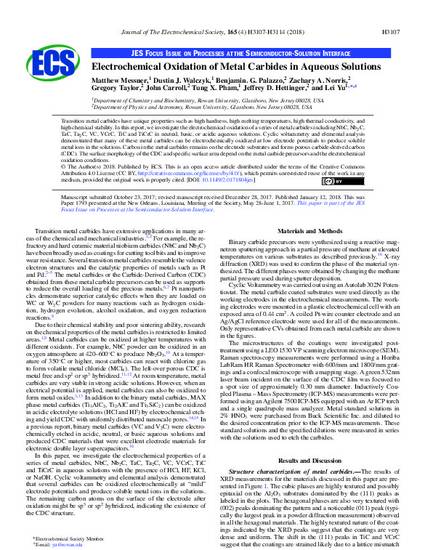
Article
Electrochemical Oxidation of Metal Carbides in Aqueous Solutions
Journal of The Electrochemical Society
(2018)
Abstract
Transition metal carbides have unique properties such as high hardness, high melting temperatures, high thermal conductivity, and high chemical stability. In this report, we investigate the electrochemical oxidation of a series of metal carbides including NbC, Nb2C, TaC, Ta2C, VC, VCrC, TiC and TiCrC in neutral, basic, or acidic aqueous solutions. Cyclic voltammetry and elemental analysis demonstrated that many of these metal carbides can be electrochemically oxidized at low electrode potentials to produce soluble metal ions in the solutions. Carbon in the metal carbides remains on the electrode substrates and forms porous carbide-derived carbon (CDC). The surface morphology of the CDC and specific surface area depend on the metal carbide precursors and the electrochemical oxidation conditions.
Keywords
- Carbide-derived Carbon,
- Electrochemical Oxidation,
- Metal Carbides
Disciplines
Publication Date
January 1, 2018
DOI
10.1149/2.0171804jes
Publisher Statement
This is an open access article distributed under the terms of the Creative Commons Attribution 4.0 License (CC BY, http://creativecommons.org/licenses/by/4.0/), which permits unrestricted reuse of the work in any medium, provided the original work is properly cited.
Citation Information
Matthew Messner, Dustin J. Walczyk, Benjamin. G. Palazzo, Zachary A. Norris, et al.. "Electrochemical Oxidation of Metal Carbides in Aqueous Solutions" Journal of The Electrochemical Society Vol. 165 Iss. 4 (2018) p. H3107 - H3114 ISSN: 0013-4651 Available at: http://works.bepress.com/lei-yu/16/
Creative Commons license

This work is licensed under a Creative Commons CC_BY International License.
